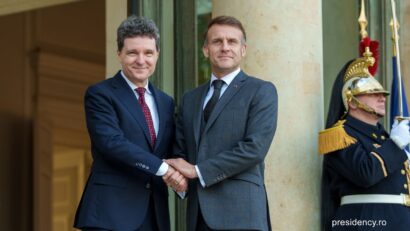The EC approves Romania’s revised NRRP
Romania's revised NRRP is realistic and supports the economy and local communities, according to Prime Minister Ilie Bolojan

Ştefan Stoica, 23.10.2025, 14:00
The European Commission has approved the final version of Romania’s National Recovery and Resilience Plan, worth a total of €21.4 billion. Of this, €13.57 billion is non-repayable funding and €7.84 billion is in the form of favorable loans. The new NRRP will be formally approved at the ECOFIN meeting in November. The revised version is realistic, says Minister of Investment and European Projects Dragoş Pîslaru, who believes that the projects in the initial plan were over-contracted.
Dragoș Pîslaru: “We transformed a plan that was related to a portfolio of highly over-contracted projects; I remind you that from 28.5 billion, we had 47.4 billion contracted, projects that were largely delayed, projects that had problems with public procurement, projects that were unclear even in terms of non-reimbursable grants. At this point, we have a revised version that is realistic, sustainable, results-oriented, and feasible to implement by August 31.”
The purpose of this revision of the NRRP was to reduce pressure on the state budget in 2026, reduce the deficit, avoid penalties that would have resulted from delays in reforms, and, last but not least, protect investments, Minister Pîslaru added. The Commission’s decision marks the end of the NRRP renegotiation process, which is now realistic and supports the economy and local communities, Prime Minister Ilie Bolojan said in response. According to him, the money will go towards investments in infrastructure, hospitals, digitization, green energy, and the modernization of the administration.
Ilie Bolojan specified that, with this approval, Romania has obtained the maintenance of coal-fired power plants in operation, a decision that ensures the stability of the national energy system, eliminates the risk of interruptions in the supply of energy and thermal energy, and means the preservation of over 4,500 jobs in these areas. At the same time, Romania is continuing its energy transition by investing in gas-fired power plants, photovoltaic parks, and storage capacities.
Ilie Bolojan explained that the revision was necessary because some of the conditions and deadlines to which Romania had committed and which, unfortunately, had not been met, had to be renegotiated. In addition, the amounts allocated in the form of loans could no longer be withdrawn until next year. Under these circumstances, Bucharest’s priority was to maintain realistic stages and deadlines and to preserve all non-reimbursable funds in order to secure investment funds, the prime minister added. He stressed that this agreement represents an important step towards regaining credibility with European partners. The negotiated terms and conditions will have to be respected by the government, ministries, and local authorities in order not to lose the European grants allocated to Romania. (MI)






























